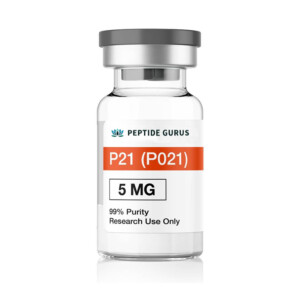The P21 (P021) peptide and cerebrolysin have both garnered attention in the scientific community for their potential therapeutic benefits, particularly in neurological applications. As a leading provider of research peptides, PeptideGurus is committed to offering products that meet the highest standards of quality and purity. Our strategic alliances with WHO/GMP and ISO 9001:2008 certified manufacturers allow us to provide these peptides at competitive prices, ensuring accessibility for researchers worldwide.
The P21 (P021) peptide is primarily studied for its neuroprotective properties. It is believed to promote neuronal survival and growth, making it a promising candidate for research into neurodegenerative diseases such as Alzheimer’s. The peptide’s mechanism of action involves modulating various signaling pathways that are crucial for maintaining neuronal health. This has made it a focal point of research aimed at understanding and potentially mitigating the effects of neurodegeneration.
Cerebrolysin, on the other hand, is a peptide-based drug that has been used in clinical settings for several decades. It is composed of low-molecular-weight peptides and amino acids, and it is known for its neurotrophic and neuroprotective effects. Cerebrolysin is often used in the treatment of conditions like stroke and traumatic brain injury, where it is thought to support neuronal repair and regeneration. The drug’s efficacy has been demonstrated in numerous clinical trials, although its exact mechanism of action remains a topic of ongoing research.
When comparing P21 (P021) peptide vs cerebrolysin, one must consider the differences in their composition and application. While P21 (P021) is a specific peptide studied primarily in research settings, cerebrolysin is a complex mixture used clinically. This distinction is crucial for researchers and clinicians when selecting a peptide or peptide-based drug for their specific needs.
The FDA’s latest guidelines emphasize the importance of rigorous testing and quality assurance in the production of peptides. At PeptideGurus, we adhere to these guidelines by utilizing advanced testing methods such as HPLC, GCMS, and LCMS, in collaboration with JANOSHIK LAB. This partnership ensures that our products meet the highest standards of quality, providing researchers with reliable and effective tools for their studies.

Both P21 (P021) peptide and cerebrolysin have shown potential in supporting cognitive function and neuroprotection. However, their applications and mechanisms differ, highlighting the importance of understanding each compound’s unique properties. Researchers must carefully evaluate the specific needs of their studies to choose the most appropriate peptide or drug.
In terms of safety and side effects, cerebrolysin has a long history of clinical use, with a well-documented safety profile. P21 (P021), being primarily used in research, has less extensive safety data available. This is an important consideration for researchers when designing studies and interpreting results.
The cost-effectiveness of P21 (P021) peptide vs cerebrolysin is another factor to consider. PeptideGurus’ competitive pricing, achieved through strategic partnerships, makes P21 (P021) an attractive option for researchers working with limited budgets. Cerebrolysin, being a commercially available drug, may have higher costs associated with its use in clinical settings.
For those interested in the latest developments in peptide research, PeptideGurus offers a comprehensive portfolio of research peptides, including P21 (P021). Our commitment to quality and customer satisfaction ensures that researchers have access to the best tools for advancing their studies.
The potential therapeutic applications of P21 (P021) peptide and cerebrolysin continue to be explored in various research contexts. As our understanding of these compounds grows, so too does the potential for developing new treatments for neurological disorders.
In conclusion, the comparison of P21 (P021) peptide vs cerebrolysin reveals distinct differences in their composition, application, and research status. Both have valuable roles to play in the field of neuroscience, and ongoing research is essential to fully understand their capabilities.
As a trusted supplier, PeptideGurus is dedicated to supporting the scientific community by providing high-quality research peptides. Our products, backed by rigorous testing and quality assurance, are designed to meet the evolving needs of researchers worldwide.
For those seeking further information on P21 (P021) peptide vs cerebrolysin, PeptideGurus offers expert consultation services. Our experienced team is available to assist researchers in selecting the most suitable peptides for their studies, ensuring optimal outcomes.
PeptideGurus is a leading supplier of American-made research peptides, offering top-quality products at competitive prices. With a focus on excellence and customer service, they ensure a secure and convenient ordering process with global shipping.
CONTACT